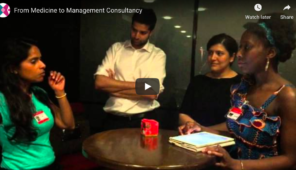From medicine to career coaching for doctors
We had a panel of six career coaches at our networking event in September 2015, discussing how they went from medicine to career coaching for doctors

Thank you to all the delegates that made it to our networking event on Saturday 19th September and a big thank you to our panel of six career coaches.
Our delegates came with different agendas – some wondering if perhaps they needed guidance from a career coach and some wanting to try it themselves.
Our career coaches all came from different backgrounds, so it brought many skills and viewpoints to the table.
OUR PANEL
DR. EVGENIA GALINSKAYA
Career Success Consultant & Founder of Other Options for Doctors – Freelance career advisor at Post-Graduate Medical and Dental Education at the London Deanery – Ex Dermatology Registrar – Cambridge University Medical Graduate.

DR. TIM OJO
Executive Coach – Consultant Psychiatrist – Executive Medical Director for Sussex Partnership NHS Foundation Trust.


Professional Coach for Doctors – Previous Dean and Director of Post-Graduate Medical and Dental Education at the London Deanery – Ex-Consultant Rheumatologist.
CEO of Fiona Sykes Associates – Executive coach and trainer -Leadership Developer.

Career Coach with high end mental health management background in Care Quality Commissioners (CQC) and Supported Housing services, including local authority, Trust and CCG groups.

SHIRANI RAJAPAKSA
Global Healthcare Advisor – Ex Haematology Registrar who has received and delivered career coaching on her ongoing journey.

A SELECTION OF QUESTIONS POSED TO OUR PANEL:
WHAT DO CAREER COACHES DO?
They guide people through career challenges. This can of course cover a broad spectrum of different issues.
EG explains the difference between a mentor, a coach and a counsellor.
A mentor is someone who identifies with a particular element of your own journey
A counsellor is someone who helps you resolve past issues to help you move towards a more functional present
A coach is someone who meets with a functional you in the present but you have not achieved all of your goals/dreams. The coach helps you reach your optimal future by posing thought provoking questions.
The emphasis in coaching is on self-awareness and taking responsibility for yourself and your life.
WHO BENEFITS FROM CAREER COACHING?
Three common traits of people that benefit are:
- People who can identify what they hold most dear and what makes them feel alive
- People who can ask themselves difficult questions
- People who have an open mind
DO THE COACHES HAVE ANY PRE-REQUISITES FOR WHO THEY WORK WITH?
In general, coaches would not take people who need counselling. You need to be thinking clearly and able to ask yourself the thought provoking questions needed to move you towards your optimal future.
Often, going within yourself can bring on a depressive episode and you need to be equipped to cope with this if it happens.
As my meditation teacher would often say to me during turbulent periods in my own life – before a new structure falls into place, there is always chaos.
- You should be committed to making a change in your own life.
- You should be able to develop your own resources.
- My favourite acronym of the day sums it up nicely: AMA
Ability | Motivation | Attitude
DOES GETTING FORMAL QUALIFICATIONS TO BECOME A CAREER COACH MAKE A DIFFERENCE?
The answer here: it depends!
Are you planning on making this your mainstream career? If so, it could be a good way of gaining credibility and making yourself more formal.
However, don’t let the lack of professional qualifications deter you.
What matters most to coachees is: can you help me?
If you feel motivated enough to motivate others, don’t wait, just go for it!
IS CAREER COACHING DIFFERENT FROM EXECUTIVE COACHING?
Many of the principles are the same, but executive coaching applies to people at a more senior level in their career.
It also tends to be much more expensive!
ARE THERE ANY PARTICULAR THEMES THAT TEND TO KEEP COMING UP?
- Doctors are schooled to be the best and the brightest, in short they are schooled for a “power culture”. When they go into the NHS and remain as “junior doctors” until they make consultant, they struggle with how to influence people more senior than themselves and begin to feel powerless
- Lack of self-awareness and a sense of who they are
- People often know what they don’t want, not what they do want.
- A very busy lifestyle (work, home, exams) means it’s difficult to stop and take a step back. People often say “I feel like I am on a rollercoaster and I can’t jump off”
To help career coaches can:
- Boost your self-confidence and motivation
- Encourage you to reflect inwardly and go on a journey of self-discovery
- Examine you in context with your history
- Help you breakdown your transferable skills
PRACTICALITIES!
The market rate for career coaching ranges from £50 ph to £400ph. The higher end of the spectrum being more executive coaching level.
Lis has her own book published New Coach: Reflections from a Learning Journey, available for £20 or £12.50 on Kindle (Amazon). (clicking the link may support this site if you purchase)
Trainees can sign up to 4 free coaching sessions of 90 mins through the London Deanery. Thereafter, sessions are charged at £150 for 90 mins.
Fiona usually signs coachees up to 6 sessions and conducts sessions using Skype (including evenings and weekends).
Evgenia usually recommends 4 to 6 sessions as standard. She offers 1 free initial consultation lasting 45 mins. Her coaching is practical and also covers skills like networking. She conducts session through Skype or by telephone.
Mercy reviews the situation first but says 4 to 6 sessions are standard. The decision is based on outcome. She conducts sessions by Skype or face to face.
For more information, on a career as a career coach, check out our guide.
MF Admin Team
Latest posts by MF Admin Team (see all)
- Exploring Career Opportunities for Doctors in the Pharma Sector - 28th May 2023
- The Ultimate 101 LinkedIn Guide - 21st April 2023
- Transforming the Face of Medicine – with Melanin Medics - 24th January 2023

